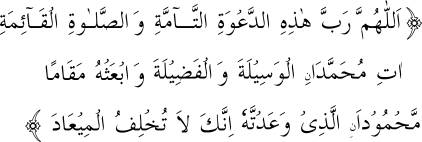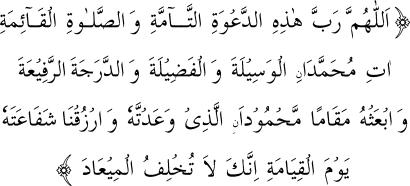


Part III: Adhaan
Q. What is the meaning of Adhaan?
A. Adhaan literally
means to call. In Sharee’ah, Adhaan means to call for the
prayers in particular wordings. (The wordings for Adhaan have been
dealt with in Part 1.)
Q. Is Adhaan a fard
or sunnah?
A. It is sunnah, but as it
reveals a special glory of Islam, much stress is laid on it.
Q. For which prayers is Adhaan
sunnah?
A. Only for the five fard
prayers and for the Friday prayers is Adhaan a sunnah and Adhaan
is not required for any other prayer.
Q. At what time should Adhaan
be given?
A. A little before every fard
prayer, Adhaan should be given. If it was given before the actual
time of the prayer then it must be given again when the correct time enters.
Q. What is the mustahab
method of delivering the Adhaan?
A. There are seven mustahab
things in Adhaan:
Q. What is Iqaamah?
A. Iqaamah is to repeat the
wordings of Adhaan just before beginning the fard
prayers. But in Iqaamah, the words “Qad qaamatis-salaah”
are added, two times, after “Hayya ‘alal-falaah”.
Q. How is it to say Iqaamah?
A. Iqaamah is sunnah
for fard prayers but for other prayers it is not required.
Q. Are Adhaan and Iqaamah
a sunnah for men and women both?
A. No. They are sunnah only
for men.
Q. How is it to say Iqaamah
and Adhaan without wuduu’?
A. Saying Adhaan
without wuduu’ is allowed but it is bad to make a habit of it. Iqaamah
without wuduu’ is makrooh.
Q. If one says his fard
prayers at home, should he say Adhaan and Iqaamah also?
A. Adhaan and Iqaamah
in the neighboring masjid will be enough, but it is better to say them at home
also.
Q. Should a traveller say Adhaan
and Iqaamah during his journey?
A. Yes. Both Adhaan
and Iqaamah should be said when one is at a lonely place. It will not
matter if one says only Iqaamah and not Adhaan but it is makrooh
to leave both of them.
Q. Is it allowed if one person
says Adhaan and another says Iqaamah?
A. If one who said Adhaan
is not present or if he is there and he does not mind it, then another person
may say Iqaamah. If the person who said Adhaan minds it,
then it is makrooh for any other person to say Iqaamah.
Q. How much time should be
allowed to pass to say Iqaamah after the Adhaan?
A. In all prayers except Maghrib,
one should wait after the Adhaan until the people who are eating
or are in the bath finish up and can join the prayers. Then Iqaamah
should be said. In Maghrib prayers, after giving Adhaan
the Iqaamah should be said after the lapse of time equal to the reciting
of three aayaat only.
Q. What is the Ijaabat
(answer) for Adhaan and Iqaamah and what is the ruling on
that?
A. Ijaabah for both Adhaan
and Iqaamah is mustahab. Ijaabah means that the
hearers should repeat the wordings as the Mu’adh-dhin or Mukabbir
says. But after hearing the sentences “Hayya ‘alal…”, one should
say:

There is no power and no strength, except with Allah.
And in Fajr prayers, after hearing “as-salaatu khayrum
minan-nawm” say:

You have spoken the truth and spoken well.
After hearing “Qad qaamatis-salaah” during the takbeer
(iqaamah) say:

May Allah establish it and keep it forever.
Q. What prayer should be read
after the completion of the Adhaan?
A. After Adhaan this
du’aa (supplication) should be said:

Oh Allah! Lord of this perfect call, and of the prayer to be offered
presently. Grant to Muhammad the way of approach unto You, and also eminence,
and raise him to the glorious position which You have promised him. And You do
not go back on Your promise.
Alternatively:

Oh Allah! Lord of this perfect call, and of the prayer to be offered
presently. Grant to Muhammad the way of approach unto You, and also eminence and
high position, and raise him to the glorious position which You have promised
him, and give us his intercession on the Day of Judgment. And You do not go back
on Your promise.
(Some phrases of this version, which is common, are not established
in any ahadeeth.)


